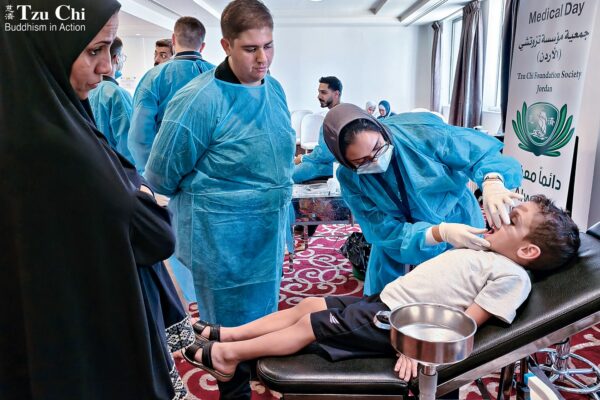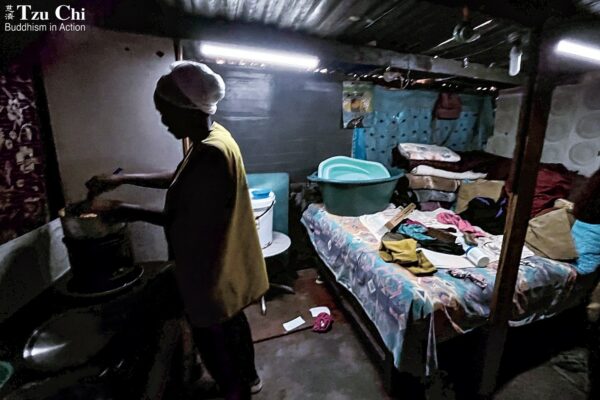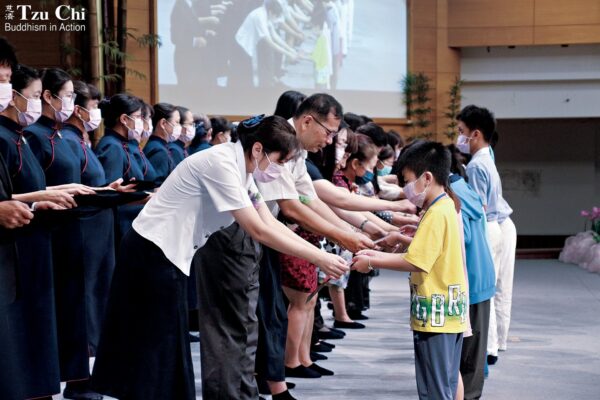By Chen Li-an
Translated by Wu Hsiao-ting
Photos courtesy of Masako Ono
Tzu Chi volunteer Masako Ono was both happy and worried when 10,000 medical masks arrived on Saipan. That the masks could be used to protect frontline workers made her very happy. But what worried her was how she, the only Tzu Chi volunteer on the island, was going to manage the distribution of so many masks.
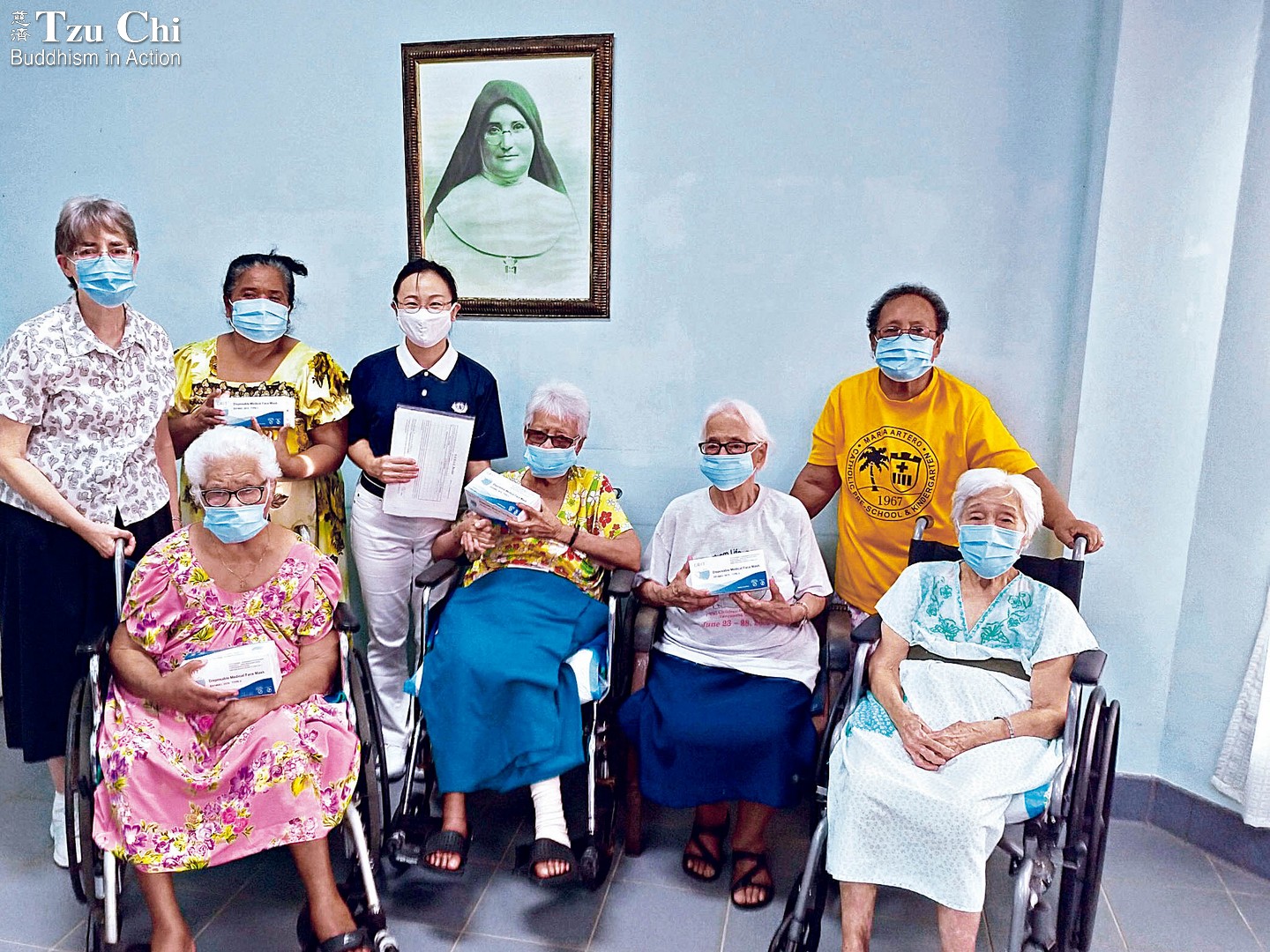
Tzu Chi volunteer Masako Ono delivered masks to a convent on Saipan where several retired nuns over 80 lived.
Saipan, in the western Pacific Ocean, is the largest island of the Commonwealth of the Northern Mariana Islands (CNMI), a territory of the United States. With an area of 122 square kilometers (47 sq mi), the island is about half as large as Taipei. It boasts beautiful natural scenery, year-round tropical weather, and stunning diving and snorkeling experiences, making it one of the top vacation spots on the globe. The brilliant sunlight, white sandy beaches, and all manner of water activities attract tourists from all over the world.
Tzu Chi volunteer Masako Ono, originally from Taiwan, moved to Saipan in May 2019 with her husband, Kazuhiko Ono, the Japanese consul to Saipan. Newly arrived, she savored the vacation ambience on the island evoked by the omnipresent coconut trees and clear blue oceans.
The pandemic
Less than a year after their arrival, however, the novel coronavirus began to impact the world. In early February 2020, to prevent the spread of the virus, Saipan banned the entry of flights from China as well as people who had traveled to China in the previous 14 days. On March 23, the government shut down the borders as a further preventive measure.
The pandemic eased in May. The government allowed some flights to resume, but limited them to those between Saipan and the nearby island of Guam. Saipan’s main industry is tourism, so the prolonged closure of borders and cancellation of flights had affected the livelihoods of most people on the island. Some islanders began to worry about how they were going to make it through this period.
Like everywhere else in the world, masks had become a necessity on Saipan by that time. However, a medical mask sold for at least one U.S. dollar. Though the average local hourly wage was seven U.S. dollars, not much money was left after the rent and utility bills were paid. For those who had lost their incomes or jobs, a medical mask had become a luxury.
The pandemic had affected Masako Ono’s life as well and allowed her to see the plight of the underserved. On a visit to a nursing home, she noticed that the masks the workers there wore were of very poor quality. She had also learned that a local member of the clergy had tested positive for the coronavirus. She eagerly wanted to provide good quality masks to those working on the front lines.
Acting on her desire to help, she applied for 700 masks from Tzu Chi headquarters in Taiwan. She ended up receiving a total of 11,850 masks.
She was happy to have received so many masks, but was worried too. She was happy the masks could be used to protect lives, but worried how she was going to manage their distribution. After all, she was the only Tzu Chi volunteer on Saipan. She didn’t know how to sort so many masks in a short time or how to set up videoconferencing with Tzu Chi headquarters in Taiwan when the mask donation ceremonies were taking place. Thankfully, a fellow volunteer in Taiwan, Peng Xiu-jing (彭秀靜), contacted her during that time with some welcome news. Peng told Ono that her son, Liang Wei-yuan (梁維元), was studying on Saipan and that he would be able to give her a hand.
“I’m so thankful to have the young man’s help,” said Ono. With Liang’s assistance, Ono was able to quickly distribute the masks to hospital workers, nursing home workers and residents, members of the clergy, students, and others. Ono sincerely hoped that the protective gear would help safeguard frontline workers and other people who had received the donation.
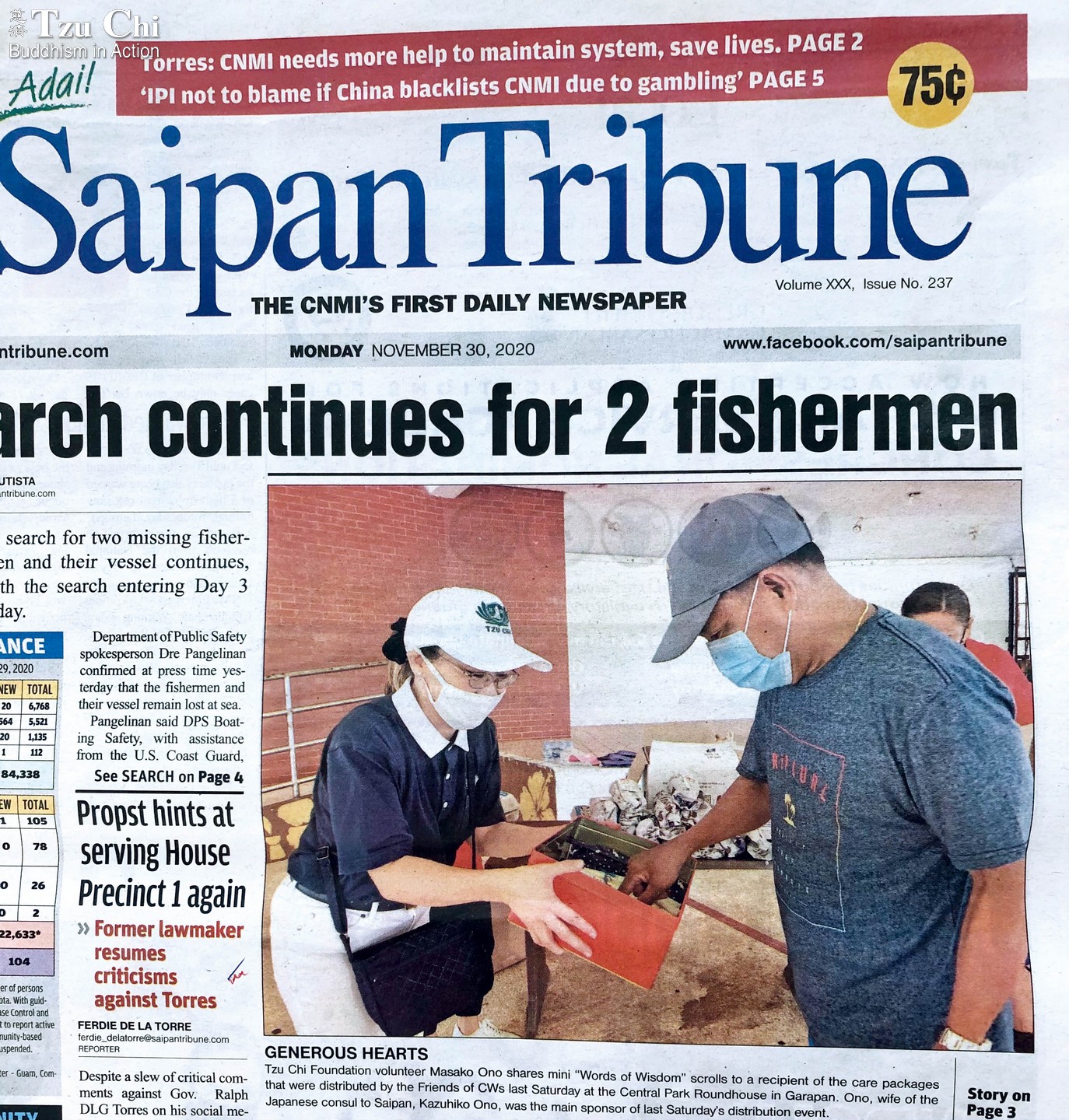
Saipan Tribune reported on the food distribution conducted jointly by Tzu Chi and Friends of CWs for underserved foreign workers on Saipan.
The convergence of goodwill
In June 2020, the American federal government distributed relief cash—1,200 U.S. dollars per person—to all eligible individuals on Saipan. Stimulus packages for the unemployed followed. However, the large number of foreign workers on the island who did not possess American citizenship were excluded from the pandemic unemployment assistance. Foreign workers with children who were natural-born citizens could at least receive monthly food stamps due to their children’s citizenship status, but those who didn’t have such children weren’t so lucky.
With assistance from Tzu Chi headquarters, Ono originally planned to work with local organizations to distribute daily necessities to those foreign workers who were particularly hard pressed to get by. However, that plan was disrupted by Typhoons Goni and Vamco. The two typhoons slammed into the Philippines in November 2020, wreaking havoc in parts of the nation. The relief plan for Saipan was put on hold while the Tzu Chi Foundation poured their resources into aiding typhoon survivors in the Philippines.
Though the plan had changed, Ono thought of what Dharma Master Cheng Yen had often said about the need to reach out to the needy in a timely manner. The end of the year and the holiday season was drawing near, and Ono really wanted to help people have a better time during this time of the year. She therefore decided to take money out of her own pocket and purchase rice, cooking oil, eggs, and other food to distribute. She also ordered a large amount of fresh produce to distribute to promote vegetarianism. She even packaged the vegetables and fruits with old newspapers to avoid creating more plastic packaging waste.
Ono teamed up with a local organization, Friends of CWs, to compile the recipient rosters and distribute the goods. CWs are foreign workers with CNMI work visas. Friends of CWs focus their efforts mainly on aiding unemployed foreign workers on the island.
Ono explained, “Members of Friends of CWs are not rich themselves, but they are better off than those who are unemployed. They still have jobs and can maintain their livelihoods.” Just like Tzu Chi, funded mostly by small donations from its members, Friends of CWs rely on donations from members to accumulate funds and buy necessities to help the needy.
“We didn’t have many goods to distribute,” said Ono, “so we needed to make sure that what we were giving out would go to those most in need of help.” Strict oversight was exercised throughout the process—from obtaining lists of the unemployed, making home visits, to carrying out the distribution itself. In addition to the goods purchased by Ono, Friends of CWs also provided rice, canned foods, and eggs.
The distribution was held at the end of November 2020. One hundred and thirty-eight care packages were distributed during the event. Recipients included foreign workers from the Philippines and a small number of workers from Turkey. Ono shared the origin of Tzu Chi during the event and gave away mini “Words of Wisdom” scrolls carrying aphorisms by Master Cheng Yen. She made those small gifts herself, hoping that the inspiring messages on them could bring encouragement to people experiencing a difficult time due to the pandemic.
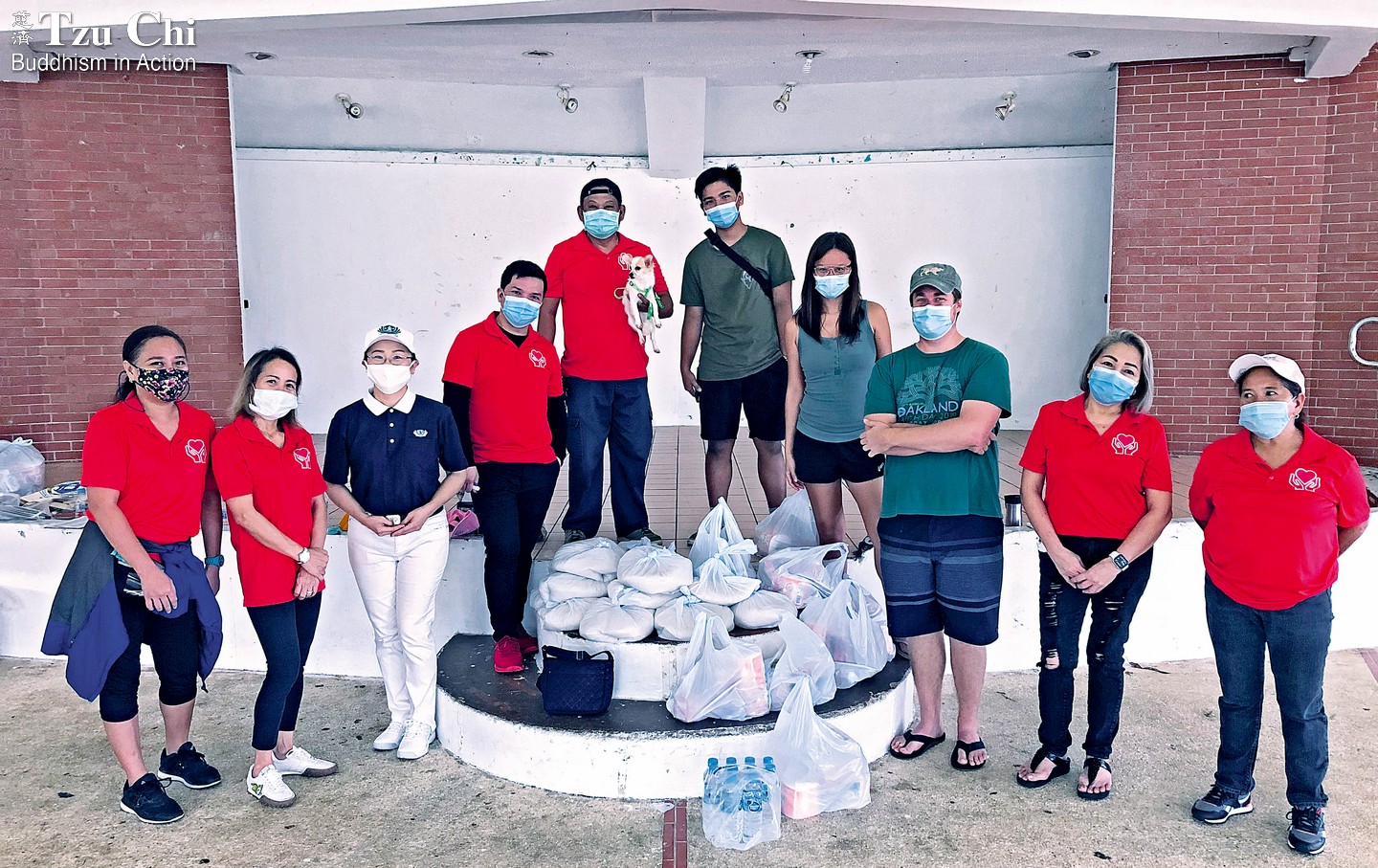
Volunteers from Friends of CWs pose with Tzu Chi volunteer Masako Ono.
Love never goes away
In 2015, Typhoon Soudelor hit Saipan, causing severe damage to businesses, homes, and infrastructure on the island. Upon receiving requests for assistance, Tzu Chi provided rice and 1,000 pots for those affected. That was the first encounter Tzu Chi had with Saipan.
Five years later, the pandemic connected Tzu Chi with Saipan again. Even though there was only one Tzu Chi volunteer on the island, by working with a local charity group, she was able to help relieve the plight of people impacted by the coronavirus. Ono said, “When I saw the aid recipients’ expressions soften during the distribution, their eyes showing gratitude and appreciation, I felt everything was worth it.”

